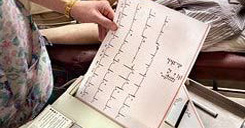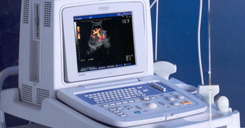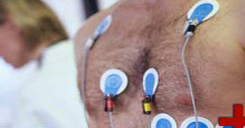


ECG
ECG (electrocardiogram) is a test that measures the electrical activity of the heart. The heart is a muscular organ that beats in rhythm to pump the blood through the body.
The signals that make the heart's muscle fibres contract come from the sinoatrial node, which is the natural pacemaker of the heart.
In an ECG test, the electrical impulses made while the heart is beating are recorded and usually shown on a piece of paper.
This is known as an electrocardiogram, and records any problems with the heart's rhythm, and the conduction of the heart beat through the heart which may be affected by underlying heart disease.
What is the resting ECG used for?
The information obtained from an electrocardiogram can be used to discover different types of heart disease. It may be useful for seeing how well the patient is responding to treatment.
- It is a good idea to have an ECG in the case of symptoms such as dyspnoea (difficulty in breathing), chest pain (angina), fainting, palpitations or when someone can feel that their own heart beat is abnormal.
- The test can show evidence of disease in the coronary arteries. Unfortunately, in many people who have significant narrowing of the arteries supplying the heart muscle, the ECG recording made at rest is often normal. Therefore, if a significant narrowing is suspected, an ECG recording is often made when the patient is exercising (an exercise stress test) because this is more likely to reveal the problem.
- An ECG can be used to assess if the patient has had a heart attack or evidence of a previous heart attack.
- An ECG can be used to monitor the effect of medicines used for coronary artery disease.
- An ECG reveals rhythm problems such as the cause of a slow or fast heart beat.
- To demonstrate thickening of a heart muscle (left ventricular hypertrophy), for example due to long-standing high blood pressure.
- To see if there are too few minerals in the blood.
An ECG may appear normal even in the presence of significant heart disease. Thus, for a full assessment of the heart, other tests may be needed


